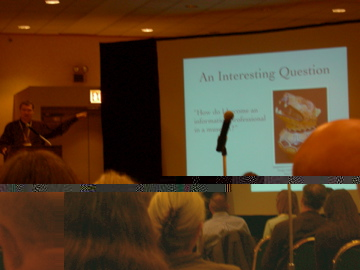You are hereat MCN in Chicago: museum studies then and now
at MCN in Chicago: museum studies then and now
 mcn in chicago: opening plenaryi'm at MCN in Chicago for the next few days, and i'll be blogging my notes. first up, a day on professionalization and changes in the field, as th is is MCN's 40th anniversary.
mcn in chicago: opening plenaryi'm at MCN in Chicago for the next few days, and i'll be blogging my notes. first up, a day on professionalization and changes in the field, as th is is MCN's 40th anniversary.
Museum Studies Programs: That Was Then, This Is Now
Marla Misunas began this session by surveying the emergence of 'computer skills' as a requirement in collections management jobs advertised in Aviso. Amusingly, she notes, these were required first in assistant registrars, before registrars had to be computer literate. Marla suggests that the following skills are required for collections managers:
- database management
- network and intrafstructure
- imaging and image management
- internet
- web site creation / maintenance
- standards
- handson experience
- networking
but she notes that these concrete skills need to be balanced with an awareness of museum issues, and a professional attitude that includes contribution to both institution and community. these are the ways to grapple with issues like developing technology, new methods for providing access to information, and meeting museum's responsibilities for quality information and interpretation of museum collections.
Paul Marty presents his ongoing exploration of the relationships between library/information science/studies, and how to answer the question his student's ask: 'how do i become an information professional in a museum"... but what is that anyways? he's been studying 'information work' in museums. his goals: improve understanding of role, increase students studing in area, encourage professional deveopment. to understand the role, paul wants to: 1. survey professionals, develop core competencies, document contribution to museum; 2. survey of lis and museum studies programs; to design common curriculum, and develop new programs; and 3. encourage professionals, guide to best practices, online resource centre, review possibilites for certification.
Sarah Marcotte [via skype] presented a survey of museum education programs / museum studies programs. she began by saying that she thinks museum educators need to become more technologically aware. for her talk, she spoke with faculty from 7 Museum Studies programs, and asked if they taught tech skills to educators, whether there were technology projects in educator training, impact of emerging tech. on education, and preparation of museum educators to be project managers. is tech changing the way we teach people to teach? (penn state, johhns hopkins, bank street, wellesley, tufts, jfk, gw). most were still teaching basic ed theory. but there was a wide rage in the way that tech was used in programs, and divergence in how they addressed [or didn't] address tech. educators have a significant contribution to make to the development of tech. progjects, because they are trained to understand how people take in information, how they learn, and what kinds of scaffolding they need. she values on-line professional information for training purposes (<blush>including the MW archive </blush>), and thinks that museum professionals need to use available tech to share the skills they have.
Phyllis Hecht, in talking about the museum professional in the 21st century reminded us -- thank you! -- that technology permeates the whole museum, and isn't just the purview of 'specialists'. as students come to programs already having technology skills, they need to understand the nature of museums and their goals, and learn to appreciate how technology can be used to support new initiatives. a focus on community engagement and awareness reinforces the need for collaboration, and technology can enable this across the discipline, and outside it.
Discussion from the floor reinforced the need for critical thinking, creativity and interaction with communities.
jt: on the way to the mike ... what the disucssion misses is the need to distinguish between research and teaching, between pedagogy and content, and between the needs of entry level staff, mid-career professionals with a desire for advanced learning, and researchers developing knowledge in the field.
Thanks Jennifer. Fascinating post. Just to say that many of the issues discussed above were also touched on in the "School of Tech" forum at MW 2007. All the materials for this session, including the PowerPoint and a summary of the discussion can be found at Claudia Schallert's School of Tech page.
One especially hot topic was the issue you raise about the need to identify and understand the target audience of museum technology programs. At the University of Lugano, which launched a dedicated Masters program for museum technology in 2004, I think they originally anticipated mid-career professionals would enroll. Instead, virtually all the students so far have been young bachelor's graduates with little work experience. This has influenced the curriculum in the sense that students often need to be taught the basics in addition to more advanced material. It takes them time to come up to speed with the relevant discussions in the cultural heritage and museum fields.
At the forum, both Susan Chun and Erin Hersher pointed out that those who have not worked in museums before are not likely to enter at the "executive level" that many students might expect after receiving a Masters. Instead, they need to prepare themselves for the long haul, starting at entry-level or even as volunteers while they work their way up the ranks to the positions they have supposedly been trained to fill. There is no simple answer to this problem, but certainly programs like those in Lugano will have to face them head on in the years to come as traditional museum studies programs also begin to train their students in technology.
Shelley,
i couldn't agree more. there's a real need to distinguish between:
thanks for your comments.
jennifer
j. trant archives & museum informatics www.archimuse.com
j. trant co-founder Museums and the Web | partner archives & museum informatics www.archimuse.com